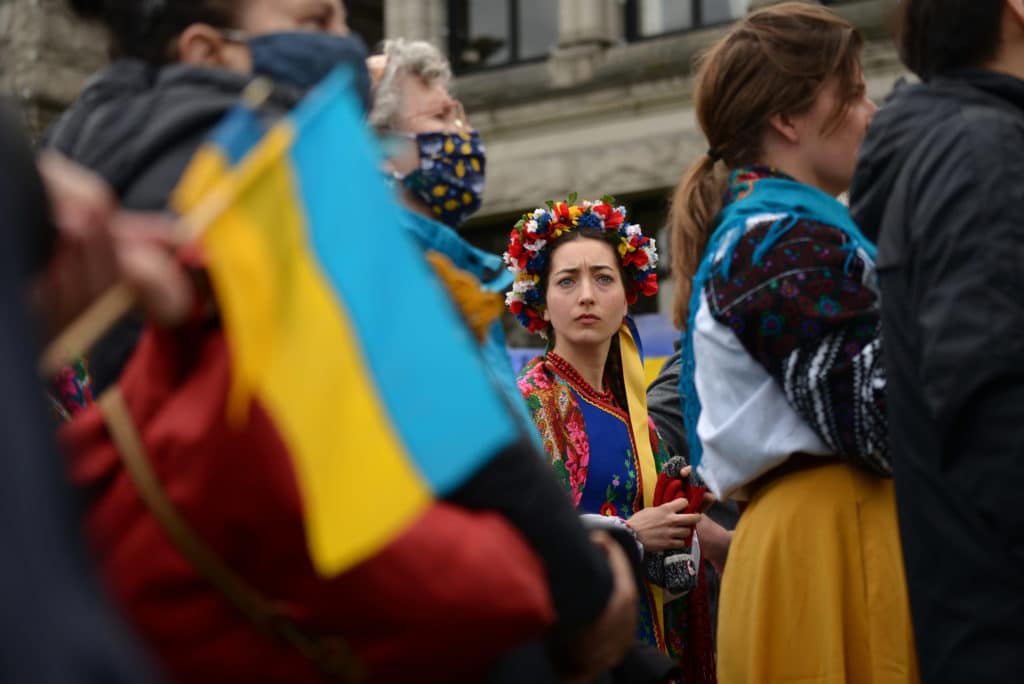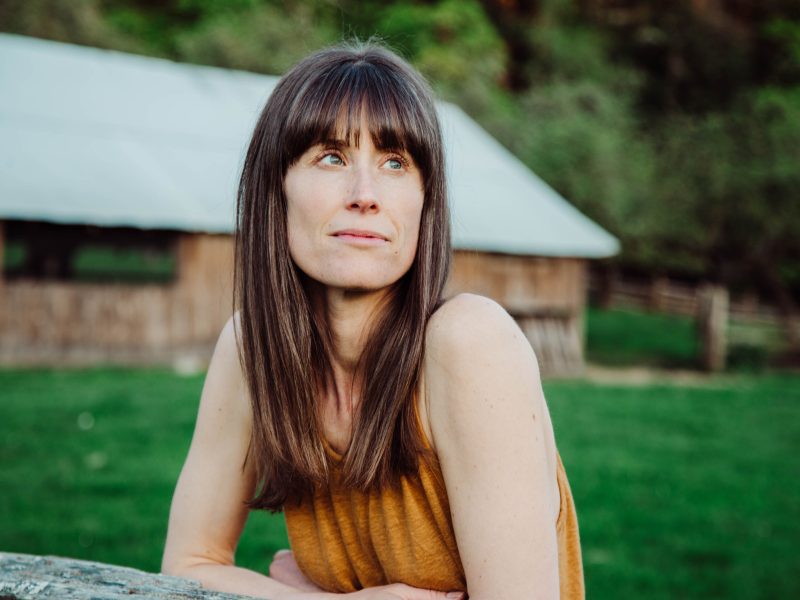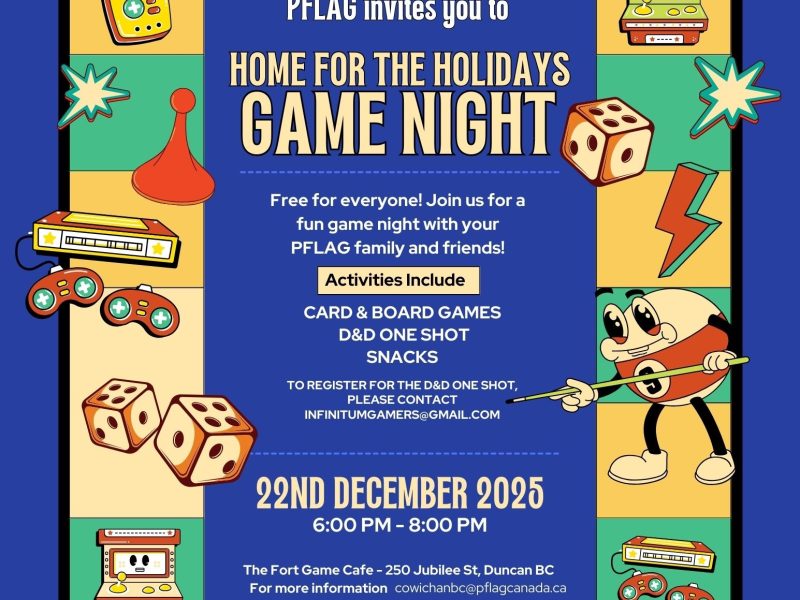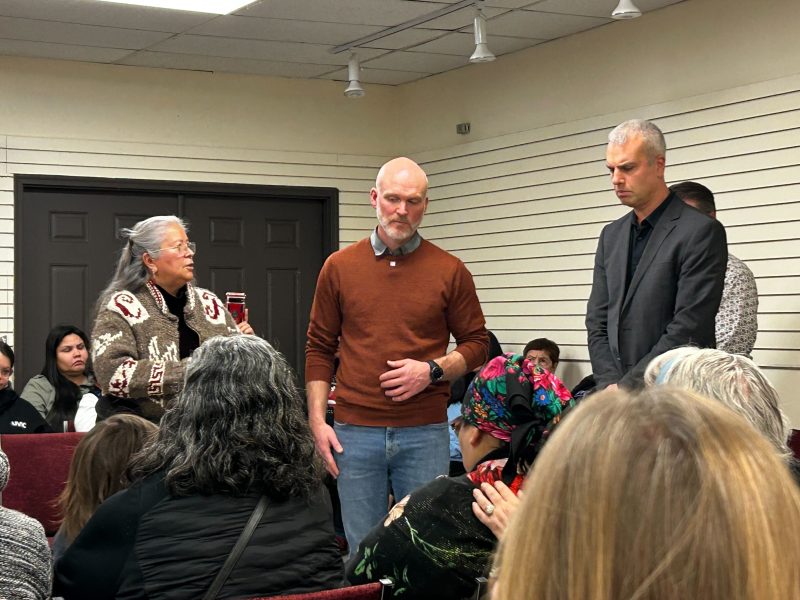
Since Russia invaded Ukraine on Feb. 24, 2022, blue and yellow flags have been visible in windows throughout the Cowichan Valley. But there’s likely no higher concentration than in the Stone Manor Estates subdivision in North Cowichan, near Duncan, B.C. Drive down Tower Ridge Road, and nearly every home has the Ukrainian flag on display, including atop a flagpole in the road’s cul de sac.

The reason for this overwhelming show of support? The Poberezhnyk family from Ternopil, Ukraine lives there.
“I’m absolutely thankful for the great support. It just make me not cry [all the time],” says 47-year-old Oksana Poberezhnyk. Her neighbour Roger Cullum surprised her by organizing a neighbourhood flag-raising event on March 1, while another neighbour, artist Colleen Sullivan, gave Poberezhnyk a digital painting that features sunflowers, Ukraine’s national flower.
After receiving a batch of cookies from yet another concerned neighbour, Poberezhnyk posted on Facebook: “Morning surprise helped me today too much! God bless my neighbors for their big hearts!”
Poberezhnyk’s own heart is heavy with grief for her family and friends in Ukraine who are either fleeing, fighting or, like her father, sheltering. Such neighbourly support, she says, is giving her strength.
“My neighbour said to me yesterday, ‘I cannot imagine how you feel because I feel so horrible.’ And I think, ‘I cannot imagine how people there feel because I feel so bad here.’” Poberezhnyk says. “And here there is nothing wrong with me. I have job, I have house, I don’t need to run somewhere, and nothing damages me, but I cannot imagine how they live now.”
‘Living in a horror movie without end.‘
Poberezhnyk, husband Ivan and daughter Polina moved to the Cowichan Valley 11 years ago because Ivan’s employer offered him a position in Canada. She says they liked the idea of living in another part of the world and they had heard Canada had a good education system.
She appreciates her new life here, but says it is hard to witness from afar the attack on her homeland. For weeks leading up to the invasion, she was a nervous wreck, monitoring her phone constantly for the latest news.
“I was so scared to wake up because the first thing I do is look: ‘no war.’ In middle of night, I open the phone: ‘news, no war. Okay, can sleep,’” she recalls.
Then two weeks ago, Poberezhnyk turned on her phone to find the invasion had begun.
“I called my relatives and they were crying,” she recalls. “After that, I cannot sleep normally, eat normally […] I’m living in a horror movie without end.”
Poberezhnyk is in constant contact with friends and relatives. Due to the 10-hour time difference, this means taking calls from Ukraine and responding to texts late at night and early in the morning before going to work.
“We are worrying about relatives, trying to talk to them every day, to calm them. Also trying to calm myself,” she says.
‘I feel like l’m there, not here’
Fortunately, Poberezhnyk’s hometown of Ternopil is in western Ukraine and so far has not come under attack. Still, her father has had to shelter much of the time in his unheated root cellar, Poberezhnyk says. Although it is an uncomfortable place to spend the night, she says her father welcomes being out of earshot of the air raid sirens.
For other relatives and friends, the situation is more dire, Poberezhnyk says. She tells harrowing stories of friends and family seeking refuge in western Ukraine or over the border into Poland on crowded trains and intermittent buses.
She is also in touch with people who’ve stayed behind in war-torn areas, although she lost contact with cousins in the small town of Schastia after it suffered extensive damage. Some of the people she knows who have stayed behind are taking care of elderly relatives too frail to flee, while others are there to defend their homeland. She says those involved in civil defence range in age from a friend’s 16-year-old daughter to Poberezhnyk’s 73-year-old school teacher.
Night after night, Poberezhnyk is told what it’s like to be in a war zone, living without electricity in homes with taped-up windows, being on night patrol without enough protective gear and staying in shelters with limited food and medical supplies. She hears about women giving birth in underground shelters without doctors or even clean water. And she listens to everyone’s fears, including worries about the “real danger” of Russian President Vladimir Putin using nuclear weapons.
“I feel like l’m there, not here,” Poberezhnyk says.
Doing what she can to support Ukraine
Poberezhnyk and her family used to travel to Ukraine every year, but haven’t been able to go back since 2019 due to COVID-19. She says that while it is hard being away from friends and relatives, she appreciates being in a position to help.
“I feel I am in the right place because I can help with money,” she says. “I try to do what I can.”
The day after the invasion, Poberezhnyk went down to the B.C. Legislature for a rally and met up with other Ukrainian nationals. She says everyone was in shock and, initially, speechless. Eventually, people started sharing what they were hearing from their friends and relatives back in Ukraine. A group of them went to a coffee shop, and decided to meet regularly “to help each other to cope.”
Poberezhnyk has gone back to Victoria for other rallies, including on Sunday, March 6 when she set up a booth at the Ukrainian Cultural Center. She sold goods like shawls and yellow and blue paint brushes she had made as well as sculptures and jewelry made by Ukrainian artists. She says she was nervous because she had never done anything like it, but because she raised a lot of money, she plans to do it again.
She is sending the proceeds directly to Ukraine to purchase night vision devices and thermal imagers for volunteers with the civil defence forces. “Without them, they’re not protected,” she explains. Poberezhnyk adds that she has raised enough money so far to equip three people.
For those she knows fleeing eastern Ukraine, Poberezhnyk has been trying to arrange accommodations in Ternopil. Closer to home, she has been helping a friend’s 19-year-old daughter who made it all the way to Victoria, thanks to her Canadian visa, after leaving home with just a small backpack and crossing the border into Poland. Poberezhnyk’s daughter picked the teen up at the Vancouver airport and brought her food and clothes and took her to stay at a friend’s place in Victoria.
Poberezhnyk is also in a unique position to make a difference through her role as a co-host of Nash Holos Ukrainian Roots Radio, which airs Wednesdays from 11 a.m. to 1 p.m. on CHLY (101.7 FM) in Nanaimo. Nash Holos means “our voice” and the show focuses on Ukrainian arts and culture. Typically, Poberezhnyk hosts the program’s second hour in Ukrainian while co-host Paulette Demchuk MacQuarrie does the first hour in English. On March 2 Poberezhnyk was interviewed in English by MacQuarrie about what she was hearing from relatives and friends about conditions in Ukraine.
Urgent need for aid
Poberezhnyk volunteers with two Canadian organizations that she would like people to consider supporting.
She says the Maple Hope Foundation in Vancouver has been able to swiftly deliver drugs and medical supplies to Ukraine. “It’s very hard to buy any medication now. In Kyiv, it’s impossible,” Poberezhnyk explains.
She adds she is working with the Cowichan Intercultural Society to set up a box for people to donate supplies for the foundation’s relief efforts.
Poberezhnyk is also involved with Ukraine War Amps. The Canadian organization was created in 2014 in the wake of Russia’s annexation of Crimea, and she says it does great work supporting injured Ukrainian soldiers as well as the families of those killed defending their country.
Other opportunities for support can be found on the Help Ukraine Vancouver Island website, established to help centralize resources, events and volunteer opportunities to help the people of Ukraine.
Poberezhnyk wants to make sure everyone understands that the situation in Ukraine is urgent and the people there need help today, not tomorrow. She says getting involved with relief efforts is making her feel “more alive.”
“If you do something […] you don’t stay just crying because you cannot help.” [end]
There will be a peace walk for Ukraine on Saturday, March 12, beginning at 9:30 a.m. outside Vancouver Island University’s Cowichan campus.



